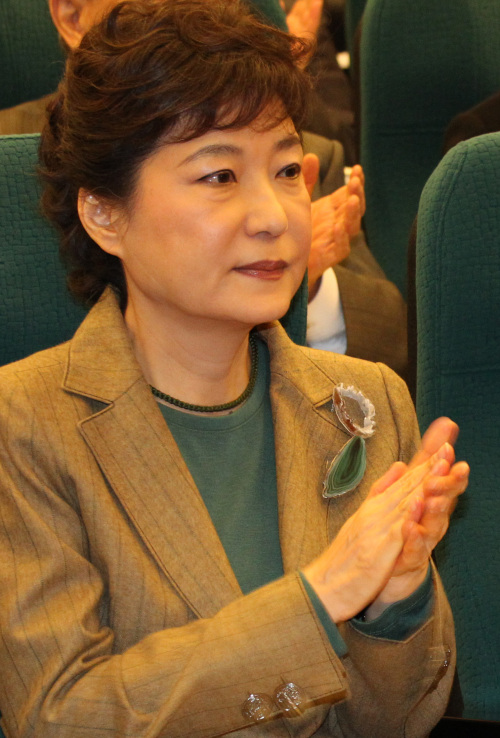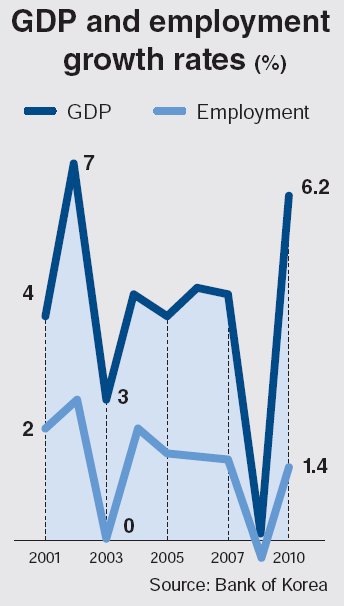A growing sense of deprivation among people in their 20-40s, which saw them vote en masse for a nonpartisan contender in the Oct. 26 Seoul mayoral by-election, has pushed the presidential front-runner of the conservative ruling party to shift focus on economic policy from growth to employment.
“From now on, the employment rate should be the main indicator for economic policies,” said Rep. Park Geun-hye of the Grand National Party at a seminar on ways to build a “Korean-style” welfare model last week.
“Individual happiness is more important than macroeconomic indicators,” she said, outlining key principles for her scheme of welfare through employment.

Her remarks drew keen attention by signaling that she will put individual welfare ahead of growth if she wins the 2012 presidential election, departing from the economic policy framework upheld by the conservative forces for decades.
Aides to Park said Monday they would soon announce a “happiness index,” similar to a measure drawn up by a commission led by U.S. economist Joseph Stiglitz in 2009 at the request of French President Nicolas Sarkozy. The index would better gauge Koreans’ wellbeing than gross domestic product and other conventional indicators, they said.
Such moves, which aim to differentiate Park’s economic approach from President Lee Myung-bak’s emphasis on growth in GDP and national income, were apparently prompted by mounting anger among voters in their 20-40s, who have been frustrated at the increasing hardship. Park tried to express her sympathy with the unemployed and underprivileged during her campaign for her party’s candidate in the Seoul mayoral race only to find the depth of voters’ discontent is far deeper than election strategists had fathomed.
Political observers note it is ironic, though a reflection of the changing times, that the former GNP leader, daughter of late President Park Chung-hee, is poised to halt the economic mantra maintained by conservatives since her father kicked off the drive to modernize the nation after taking power in a 1961 military coup. President Lee, a former construction company CEO, is one of the figures representing the era of rapid economic development.
Analysts say Park is suggesting the employment rate be the main indicator because it mirrors a more accurate picture of economic activity than jobless rate. While jobless figures tend to distort the labor market by excluding those considered to have given up efforts to find a job, the employment rate points to the ratio of employed people in the total workforce aged 15-64.
Korea’s jobless rate stood at 3.8 percent in 2010, the second lowest after Norway with 3.8 percent among 34 member states of the Organization for Economic Cooperation and Development. Its employment rate was 63.3 percent, ranking 21st in the OECD list.
Analysts indicate Korea sees its economic growth no longer translating into more jobs as its industrial structure has advanced. Major industries underpinning Korean economy such as information technology, steel and auto have not added many jobs despite their expansion, which is accompanied by factory automation.

According to figures from the Bank of Korea, the country’s economy grew by an annual average of 4.1 percent over the past decade with the number of new jobs increasing by a meager 1.2 percent.
Rep. Choi Kyung-hwan of the GNP, a former knowledge and economy minister who gives economic advice to the former party leader, said Park’s policies would focus on supporting industries that will bring more jobs.
Some critics, however, say it has yet to be verified whether the economic model being promoted by Park will lead to tangible results as she hopes. They argue that Park’s proposal to solve problems from growth without employment with welfare through employment is hardly anything new.
Noting Lee himself has taken greater care of the underprivileged since the middle of his term only to fail in winning back their hearts, critics indicate success in her attempt at the economic paradigm shift will hinge on how concrete and substantive measures she puts forward.
By Kim Kyung-ho (
khkim@heraldcorp.com)









